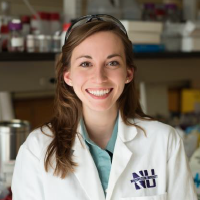News & Events / BME Seminar Series / Past Seminar Speakers / 2017-18Alexandra Kolberg

BME Seminar Series Winter 2018
Thursday, March 15, 2018 at 4-5 pm
Tech L361
Professor Samuel Stupp Lab member
BDNF Mimetic Peptide Amphiphiles for Neural Regeneration
Spinal cord injury (SCI) is a debilitating condition affecting over one million Americans. After SCI, tissue in the central nervous system (CNS) is unable to regenerate due to complex mechanisms that block neural regrowth. There are two key issues that need to be addressed to enable functional regeneration – loss of tissue structure and loss of natural growth signals. The Stupp group at Northwestern has developed an injectable biomaterial, called the peptide amphiphile (PA), that can achieve both goals simultaneously. PA molecules assemble into biocompatible and biodegradable nanofibers that form hydrogel scaffolds upon exposure to salts in the body. This PA structure is highly tunable, allowing bioactive signals to be incorporated on the nanofiber surface.
In this talk, I will describe a new PA molecule for SCI therapy that mimics brain derived neurotrophic factor (BDNF), a growth factor that induces neuronal survival, maturation, and increased electrical activity. Our in vitro studies showed that the BDNF mimetic PA activated a BDNF specific receptor, TrkB, and its downstream signaling cascades implicated in increased axonal growth and neuronal maturation. Interestingly, we found that the BDNF mimetic moiety was only bioactive when displayed on the PA’s surface, most likely due to the presentation of the epitope along the nanofiber. We also found that the BDNF mimetic PA promoted functional maturation of neuronal cells in both 2D and 3D cultures as well as cell infiltration into 3D scaffolds which is an important feature for implant integration. Lastly, I will describe ongoing in vivo studies in a mouse model of SCI. With these results taken together, our injectable biomaterial scaffold, with the ability to display an active BDNF mimetic signal, has the potential to transform current SCI therapies.
